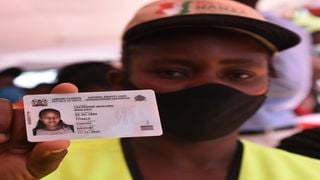
A woman displays her Huduma Namba card at the Kiambu county commissioner's offices in November 2020 during the launch of the card's issuance.
| Evans Habil | Nation Media GroupFinance and Markets
Premium
You’ll soon need Huduma Namba for M-Pesa and other digital payments, says CBK
What you need to know:
- Huduma Namba will curb fraud, especially in mobile money transfers, the bank says.
- Huduma Namba will also replace the Kenya Revenue Authority PIN.
You will soon need Huduma Namba to send cash to your loved ones in the village or perform other digital transactions, the Nation has learnt.
The controversial biometric identification scheme will also form a key part of the national digital payment system, the Central Bank of Kenya (CBK) has said.
The bank said Huduma Namba will significantly reduce fraud, especially in mobile money transfers, which has emerged as a playground for fraudsters due to the rapid growth of the payment system over the past 10 years.
The bank said the National Integrated Identity Management System (NIIMS) will also boost the safety and efficiency of online transactions that are set to be scaled up soon.
“The expected roll-out of NIIMS, commonly known as Huduma Namba, will provide a key impetus to further deepen the adoption, safety and robustness of digital payments,” CBK said in its newly launched National Payments Strategy (NPS) report for the 2022-2025 period.
The government rolled out NIIMS through Executive Order No. 1 (2018) in a bid to create and manage a central database for information about individual citizens, such as national identity cards and birth certificates to boost service delivery.
Payments landscape
National Assembly Majority Leader Amos Kimunya introduced the Huduma Bill to Parliament in December.
Huduma Namba will be the primary database for both foundational and functional data of Kenyans from which every other database with their personal data will be built.
The Bill proposes a Sh3 million fine or three-year jail term for any Kenyan who will enter wrong information for Huduma Namba in a bid to deter false declarations and enhance the integrity of data in the system.
NIIMS registered 38 million people in 2019.
CBK said Kenya’s payments landscape has significantly changed over the last decade but that there is still significant space for the growth of the use of cards, bank person-to-person payments, electronic fund transfers (EFT), and real-time gross settlement (RTGS).
Huduma Namba will also replace the Kenya Revenue Authority (KRA) PIN in changes to the law that are designed to check tax cheats. Huduma Namba Bill amends the Tax Procedure Act to make biometric ID, the key number for identifying taxpayers.
Digital payments
This means that children offered the Huduma Namba ID will automatically be listed as taxpayers once they attain 18 years and are required to file returns annually irrespective of their income status.
It also means that all adults will be required to register with KRA, offering the taxman a larger pool of people than the 5.5 million that it has netted through returns.
CBK said the increased use of digital payments is set to increase security risks, necessitating corresponding countermeasures to enhance their safety and reliability.
“However, as more payments shift to online and electronic channels, risks will increase as well. The increased use of online and digital channels also meant increased cases of fraud and scams at a customer level,” it said.
CBK said it will seek to adopt new security features for digital payments to facilitate the birth of well-protected payment channels and infrastructure.
“In the long-term, this will provide support for driving down the cost of payment systems, especially for players who currently invest resources for additional end-user protection (sometimes pushing this cost down to users). Therefore, from a CBK perspective, security will be the backbone of the Kenya’s NPS,” said the regulator.




